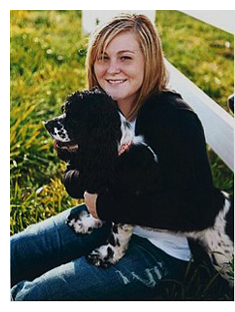
Looking for meaning in tragedy: 'You never can tell'
NBC Today interviews parents of teen lost in crash while texting
Stephanie Becker
NBC Today
 Two women, two very different passings and two families making their loved ones’ passing count for something bigger.
Two women, two very different passings and two families making their loved ones’ passing count for something bigger.
This morning on TODAY, we interviewed the parents of 18-year-old Taylor Sauer. Taylor was an Idaho college freshman heading home from school in Utah. She was driving while Facebooking a friend, ending the exchange with this tragically prophetic text:
“I can’t discuss this matter now. Driving and facebooking is not safe. Haha!”
Soon after, she slammed into the back of a slow-moving truck. She died instantly.
Within weeks, her parents, Clay and Shauna Sauer, were lobbying the Idaho Legislature for a law specifically banning texting and driving. They know it might not have saved their daughter, but they hope that publicizing Taylor’s story and pushing for the law will change attitudes and save someone’s daughter, or son, or mother.
The Sauers are on a mission to make Taylor’s life count in death. And that seems totally appropriate for a young woman who volunteered like crazy and was, friends say, a loyal and fun person.
I know the feeling.
A donation after death
Several months before my mother died of a rare and baffling brain disease, I asked her if she wanted to donate to the brain bank at Columbia Presbyterian hospital. They’re studying her disease, multiple system atrophy.
This cruel illness robs you of most of your automatic functions: walking, talking, even swallowing. It curls your limbs and makes them useless while racking your body with tremors, all the while leaving your cognitive abilities intact.
So Mom always knew how bad things were, but the sicker she got, the more she seemed at peace. Until the end, she was laughing and smiling her electric smile, especially when Dad came in the room.
Because MSA is quite rare, very little is known about it. That’s why the few doctors studying it need donated brains to learn what causes it.
By the time I summoned up the courage to ask Mommy about donating her brain to Columbia Presbyterian, she’d lost the ability to speak. But I’d barely made my pitch to her when she blinked her very dramatic “one blink for yes” with that radiant smile.
I shouldn’t have been surprised. It was totally in keeping with Mom’s lifetime of small and large kindnesses – from being the cool Mom who soothed our hormonally challenged high school friends, to starting a scholarship at her college and cooking my favorite food every time I visited.
When Mom finally left us, the nurses seemed completely confused and in a bit of a tizzy over the arrangements for her brain. Rather than falling apart, Dad was quietly resolved to ensure her donation got to the researchers in time to be viable.
His determination to fulfill her wish to help in a battle that she’d already lost seemed to give him a strength I didn’t anticipate. It was as if Mom’s decision was already giving him a purpose for holding on.
They’d been married almost 52 years.
Sometime next month Dad will get the results of what the researchers have learned from Mom’s donation. No matter what they reveal, I am filled with a calm, knowing that Mom’s passing will mean something bigger than she will know. Or perhaps she did know. Or does. You never can tell.
And sometime this week, Idaho’s legislature will take a final vote in the texting-while-driving ban. I only hope the Sauers can feel the same calm and pride I do. I hope they do. Perhaps Taylor does too. You never can tell.
Published 3-9-2012